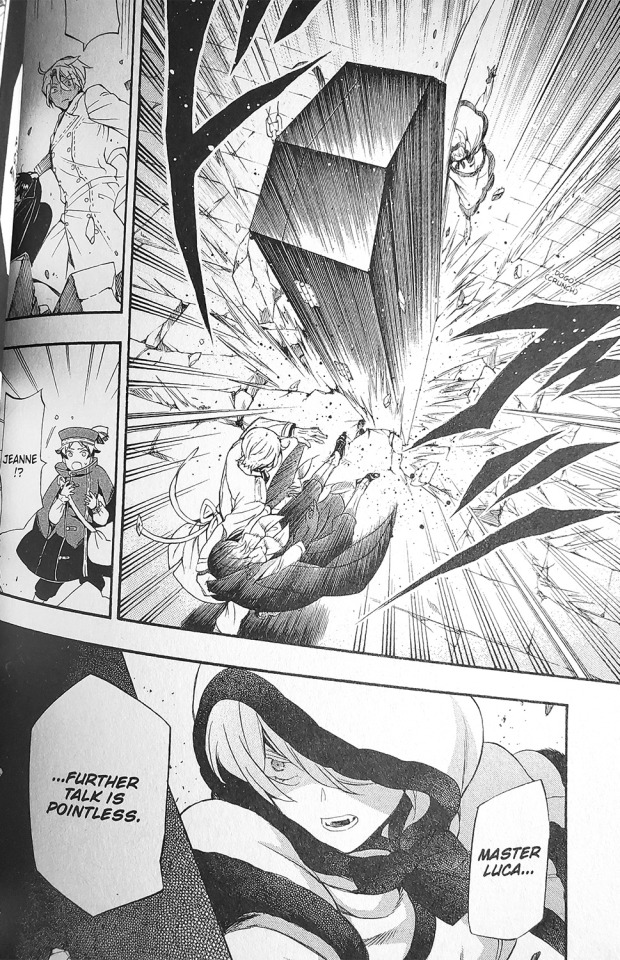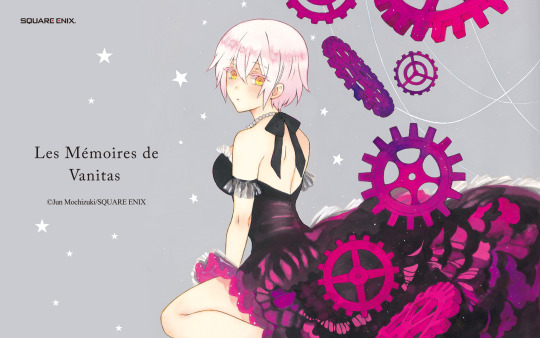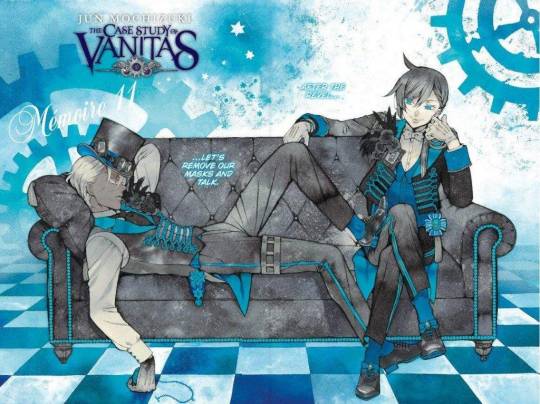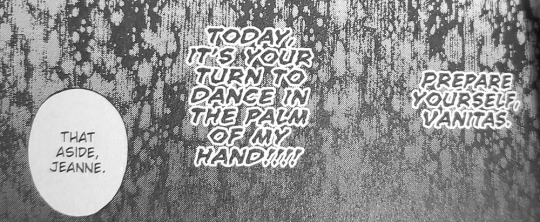#Jun giving us official art of noe looking like that
Text

SLAMS HANDS ON DESK
THIS IS A MANGA COLORING
Noe is so freakin fuck beautiful I cry
#Jun giving us official art of noe looking like that#hhhhhhhhhhhhhhhhhhh#it's a good thing he doesn't use his beauty for evil#but DAMN BOY#save some pretty for the rest of us#( & ) Child of the ark left to wander ( noe )
7 notes
·
View notes
Text
Jeanne, Vanitas and Agency
From the little I’ve dipped my toes into it, the VnC fandom seems pretty heated regarding Jeanne as a character. In drastic situations, I’ve seen accusations of misogyny based solely on someone’s comments on their feelings about Jeanne... a single character. And while yes, critiques can certainly be rooted in misogyny (must women be strong all the time? must they be submissive?), I think it’s important to consider not just the character herself, but how the story treats her and why we’re making the critiques we are.
Given that points of view in the fandom are so polarized, I’m going back to canon--to the text itself--to orient this essay. In particular, I’m going to focus on the point of agency--the freedom to make one’s own decisions about one’s self and one’s course of action. This goes beyond just Jeanne’s background as a borreau, trained to fight and follow orders. Agency is also consequential in her relationships with other characters and with the story as a whole.
(Content warning for discussion of abuse dynamics, and brief mentions of sexual assault.)
--
It’s natural to start off with Jeanne’s first appearance in the story: alongside Luca, she’s introduced as a new agent of conflict with Noe and Vanitas’s budding alliance. In fact, she is the one who initiates the physical altercation with Noe and Vanitas, while Luca is still trying to talk them into giving him the Book of Vanitas:

Aesthetically and conceptually, she’s introduced as an active element of the story. At this point, the “forced kiss” scene during the initial fight seems more like a fluke, a comment on Vanitas’s personality (and willingness to do despicable things to get what he wants) rather than Jeanne’s.
That brings me to why I found it so jarring when colored art of her that was subsequently revealed: that agency fell away to portray a visually more passive air.
In the existing full-color art we have of Jeanne, she’s more static in her environment, looking towards the viewer but with a face that looks rather blank, even meek. Specifically I want to point out this wallpaper, which I obtained from the official site fairly early on in Vanitas’s serialization (December 2016), in contrast to another piece of official art that was released of Noe and Vanitas with Memoire 11, around the same time:


In both cases, the characters are posed intentionally, rather than actively doing something. And, they’re aware of the viewer’s gaze to some extent. However, Jeanne has her back turned to the viewer, and her expression is more idealized and ambiguous. Meanwhile, Noe and Vanitas are rather assertive: their expressions are more intentionally focused, and they seem to know their situation in the artwork. Jeanne is simply passive, very nearly objectified.
...Yeah, maybe this is just my art background speaking. But I also notice something similar happening in other official colored pieces of Jeanne, such as the cover of volume 4.
By this point in the story, lack of agency has become an even more significant element in Jeanne’s character arc: we learn that she’s been cursed. Not only is she unable to speak of the curse, it’s also in direct opposition to one of her primary character motivations, to protect Luca and those she cares about. Due to her uncontrollable urge to kill and drink blood, Jeanne fears that she’ll unintentionally hurt the very people she’s trying to protect.

Jeanne’s involvement with Vanitas also unfortunately comes with a sacrifice of her own agency. Seeing that she’s been cursed, Vanitas demands that she drinks blood from no one but him in exchange for keeping her secret. He further establishes her sense of reliance on him by promising that if he ever does see her lose control, he’ll kill her (so that she doesn’t harm Luca). Whether he’s simply a smitten 18-year-old who doesn’t yet know how to conduct healthy relationships, or whether he’s crafty and intentionally drawing Jeanne in further--or even whether it’s a mix of both--this idea of Vanitas’s control over her is reflected in the cover art for volume 4.
At this point, considering the literal events of the story, Jeanne’s passiveness is not only visual, but symbolic. In this illustration, Vanitas’s hand is grabbing Jeanne by her bow, and functionally by her neck: she’s being dragged along against her will, with little means of escape. And she looks at the viewer with a surprisingly similar expression to the previous illustration: one that communicates little say in the situation.
This matches up with their literal relationship in the story itself. Knowing she’s cursed, Vanitas is establishing her exclusive reliance on him, in exchange for keeping important secrets from others with whom she’s close (i.e. threatening to drive a wedge into their relationship). He’s already pushed himself upon her physically with clearly no warning or enjoyment from her. Yes, he’s been kind. And when Dominique trails Vanitas and Jeanne on their date, she notes that Jeanne is “terribly weak against any sort of kindness.” But in spite of some more “cute” and candid moments, the overall dynamic between Jeanne and Vanitas is far from genuine kindness. Returning to how Vanitas garnered an edge over her in their initial fight--with taunting, carefully chosen words--I would phrase it more as that Jeanne, a borreau trained to kill and inexperienced with matters of feelings, is particularly susceptible to emotional manipulation. (There’s more than a little irony in this internal comment from Jeanne, at the beginning of her date with Vanitas:)

Jeanne’s relationship with Vanitas becoming important isn’t, in isolation, inherently an issue. In most cases, it’s fun to see how a character who usually appears unshakeable is rounded out when we see them at their more vulnerable times. What makes me feel squicked out and worried on Jeanne’s behalf is how it’s executed, considering how it works in opposition to how she was introduced as a character, and how Jeanne and Vanitas’s relationship harkens back to known dynamics of abuse.
In other words, my discomfort is not at Jeanne herself for falling for Vanitas and his tactics. It’s at how she’s introduced with a promise of agency in her own story, and that agency is subsequently taken away in how she’s portrayed in official art, and in plot points as the story progresses. It’s at how their relationship begins to fall into a harmful template perpetuated by rape culture, where a man forces himself upon a woman at first, but she is shown to eventually enjoy those advances even when unwanted. I had high hopes for Jeanne as a character developed with her own agency, motives (and yes, for cool fight scenes that WLW like me can admire), and so far, Vanitas’s effect on her has threatened to overshadow these. This is where I think sections of the fandom throwing accusations back and forth of each other being misogynistic, on the grounds of criticizing Jeanne and her relationship with Vanitas, fail to see the wider issue.
Of course, eliciting this sort of discomfort may even be the whole point. Jun Mochizuki is known for putting her characters through tragic and painful situations, and her previous work Pandora Hearts is rife with unstable, imbalanced, and otherwise less-than-perfect relationships. But even without this background knowledge, a decisive scene that convinces me of the intentionality of this purpose is one I’ve written about before: Jeanne’s internal fantasy as she’s left unattended by Luca and loses herself in a storybook.

Here, Jeanne fantasizes about being the agent in her own story, a position that, the art reminds us, is often occupied by a male character such as a prince. Ultimately, this progression looks innocent and could serve to remind us of Jeanne’s more vulnerable, innocuous side. But including it here in the story could also serve as foreshadowing, a contrast to what Jeanne’s situation is like for her in reality. (If you want to read more on this panel specifically, my analysis is in the source link of this post!)
Essentially, critiquing Jeanne as a character requires more nuance than simply judging her individual characteristics. It’s necessary to also take into account the way that the story treats her and her relationships with others and other forces in the story. Not just is she allowed to be soft and emotional, but what consequences does this have for her, and how do the story elements lead the reader to feel about her being soft?
Personally, I think she’s very likeable as a character--her situation just seems unfair, and I feel like she deserves so much better than Vanitas and his schemes. I mean, she could easily destroy him with her gauntlet, and he knows it! But, then, it’s Jun Mochizuki. We should probably expect to be feeling pain and pity for her characters. Still, the relationship between Jeanne and Vanitas has always kinda rubbed me the wrong way, and I think this pretty much sums up why.
102 notes
·
View notes